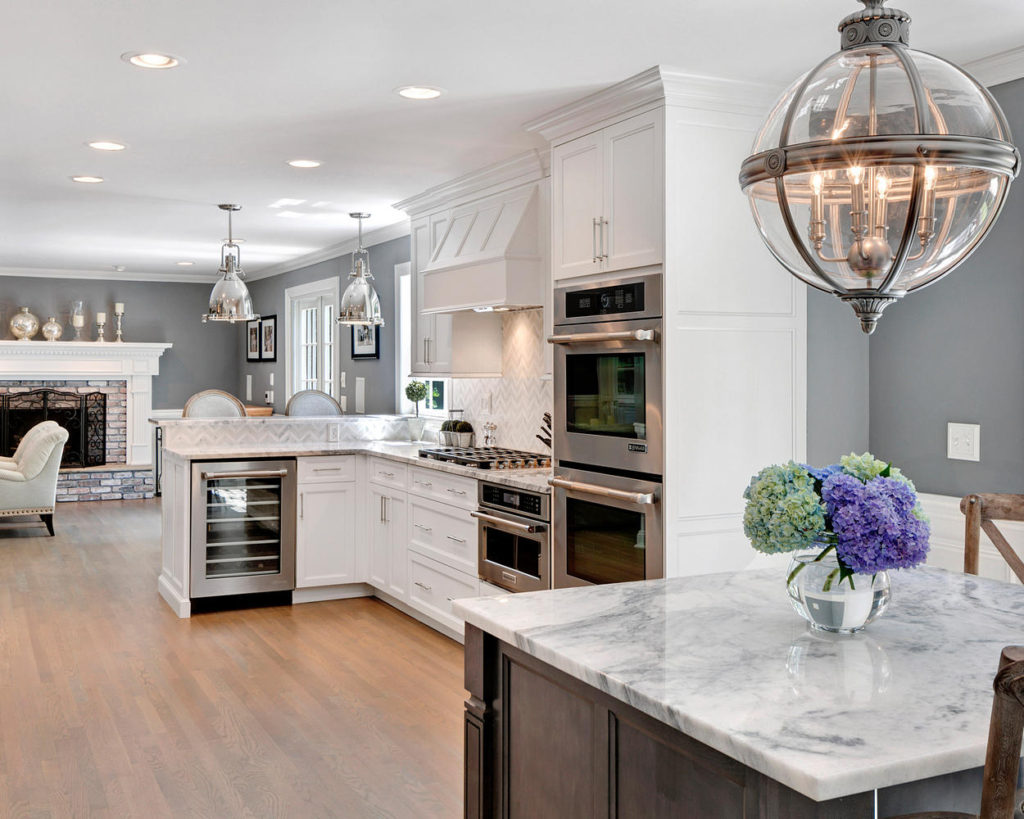Bathroom and kitchen upgrades are among the most popular home renovations, but not just because the improvements are likely to increase the home’s value. Renovations to these high-use areas can enhance the practical enjoyment of your home while adding aesthetic appeal and style.
A Better Bathroom
Bathroom makeovers can take many forms, from simple updates to total overhauls. Consider these common approaches, identified by the home experts at JCPenney Home Services, to determine the best match for your home and needs.
Tub-to-Shower Updates
According to the National Association of Realtors, more than 60 percent of homeowners prefer a stall shower without a tub. Whether you want to join the ranks of homeowners transforming their outdated tubs to modern showers, need a larger tub to soak away the day or simply want to update the look of your space, converting your tub or shower is a simple way to add functionality while transforming your bathroom.
Aging and Accessibility
More than 200,000 injuries occur in the bathroom each year, according to the National Safety Council. Especially for those with mobility challenges, water and slippery surfaces can be a dangerous combination. If you’re taking on a bathroom upgrade with accessibility in mind, be sure to consider options like slip-resistant flooring, strong grab bars, shower seats and a practical walk-in tub or low-threshold shower base.
Complete Remodel
If you’re looking for a substantial change, a complete remodel may be your best answer. This approach allows you to integrate a consistent look and style throughout the room and create a truly custom experience. However, a project of this scope often requires professional assistance. There are companies like Re-Bath, a partner of JCPenney Home Services, that offer an exclusive remodeling process to remove old materials and fixtures and replace them with beautiful, new products in a wide variety of colors and styles. Partnerships with leading brands provide ample choices in cabinets, countertops, fixtures, hardware and more for a one-stop solution to upgrading your bathroom from floor to ceiling.
Create a New Kitchen
It’s the hub of the home, so it’s no surprise that many homeowners start with the kitchen when they’re planning functional upgrades. New appliances, countertops and tilework all add to the style and function of a kitchen, but don’t overlook these highly functional features that can make your home more enjoyable.
Water Filtration
Features like the faucet and sink, and even refrigerators with ice-makers and water dispensers, can take a real beating through basic everyday use. One way to minimize the wear and tear, and take your kitchen upgrade to the next level, is a water filtration system. Cleaner, clearer water can benefit your home in a number of ways. It eliminates the need for expensive bottled water, produces cleaner, spot-free dishes, lets you save on soap and detergents, results in less build-up on fixtures and helps increase the life of appliances that use water.
Flooring
Updating the floor of your kitchen is another easy way to upgrade the space, even if it’s the only enhancement you make. For example, JCPenney Home Services offers a broad line of hardwood, laminate and luxury vinyl, all of which are affordable and practical solutions for a high-use area like the kitchen.
Lighting
If there’s one place in the home where task lighting really matters, it’s the kitchen. Proper lighting can help ensure you can see well for safe food handling. It also helps set the mood for the room, whether it’s a lively gathering with guests or a quiet candle-lit meal at your eat-in nook. You can create a focal point with exquisite fixture over a feature like an island then be sure to complement your standout fixtures with recessed lights on multiple switches with dimmers so you can customize the lighting as needed.
Find more ideas and inspiration for your kitchen or bathroom upgrade at jcpenney.myhomeprojectcenter.com.
Planning Your Project
Define your desires. Although obvious, many homeowners find this to be among the most challenging aspects of a renovation. Start by determining the scope of your project. It may be just a new tub or shower, or it may be the entire kitchen. Some homeowners find it helpful to consider their project in terms of must-haves and nice-to-haves so it’s easier to make adjustments as obstacles or finances require.
Set a budget. The easiest way to overspend on a renovation is to go into it without an established budget. If you specify what you can afford from the outset and plan against that budget every step of the way, you’re more likely to feel satisfied with your investment in the long run.
Expect the unexpected. If possible, review a blueprint of your home (or have your contractor take a look) to identify details behind the wall, like the layout of the plumbing and electric lines, which can be costly to relocate. It’s also a good idea to take a thorough inventory of your current space so you’re aware of any damage or wear that will need repaired before you begin.
Hire the help (or not). With some preliminary information on the complexity of the job and a better idea of exactly what you’re hoping to accomplish, you should be able to make a decision about whether the project is something you’re prepared to tackle on your own or if hiring professionals is more likely to provide the results you’re seeking.
Monitor progress. Even if you’re handling the project on your own, it’s a good idea to continually monitor the project in terms of budget, timeline and quality of work. It’s easier to make corrections as you go than to get to the end and discover a problem that needs reworking.
